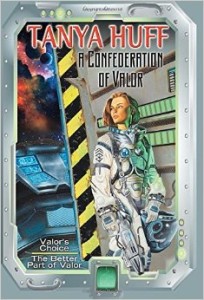 A Confederation of Valor is the omnibus edition of Tanya Huff’s first two novels in the Confederation series, Valor’s Choice and The Better Part of Valor. They demonstrate that Huff, whom I first encountered as a writer of sharp, witty urban fantasy, is equally at home in the realm of military SF.
A Confederation of Valor is the omnibus edition of Tanya Huff’s first two novels in the Confederation series, Valor’s Choice and The Better Part of Valor. They demonstrate that Huff, whom I first encountered as a writer of sharp, witty urban fantasy, is equally at home in the realm of military SF.
The centerpiece of both stories is Staff Sergeant Torin Kerr, a Confederation Marine, who is first ordered to put together an honor guard for a diplomatic mission to the newly discovered and very aggressive Silsviss. (The Confederation, which is pretty much controlled by the Elder Races, who have “evolved” past violence, has recently invited several more-aggressive races — Humans, diTaykan, and Krai — to join as members of a fighting force much needed in an ongoing war against the Others.) The commander of this Marine “honor guard” is a brand-new second lieutenant, a diTayken who just happens to have been a party to Torin’s all-night fling on the last night of her liberty. Torin begins to wonder why a diplomatic mission needs an honor guard composed of combat troops, but it turns out to have been the right call: on its way to the final set of meetings with the Silsviss, the mission’s transport is shot down over a reserve that — well, it seems the Silsviss, not being stupid, confine their adolescents to this reserve because they’re not really socialized enough to join adult society: their social skills are limited to dares, challenges, and gang wars. Of course, the question is, who set this up? Because you know it wasn’t by chance.
Having successfully managed to deal with that situation, Kerr next is put in command of a group of Marines guarding a scientific expedition investigating a recently discovered ship from a previously unknown species. This time the commander is a Krai captain with political connections whose major talent is self-promotion. There are a few more wrinkles in this assignment: the ship has also apparently been discovered by the Others, and just might have an agenda of its own.
Huff has carried over the wit and attitude of this series, as well as building fast-moving plots. It was A. E. Van Vogt who said a writer should put in a plot twist every eight hundred words, and Huff seems to have taken that advice to heart: just as everything seems to be finally under control, someone – or some thing – throws a monkey wrench into the works.
Huff’s other strengths are also in evidence: characterizations are deft and sharply drawn, dialogue is sharp, and the story lines are very clear, even with all the monkey wrenches. She also demonstrates again her ability to use stereotypes and clichés effectively — somehow, they become fresh: General Morris, Torin’s commanding officer, is the prototypical politician in uniform, as Torin is the prototypical sergeant, while Captain Carvag of the Berganitan, which transports Torin and her troops to both assignments, is another — let’s call it archetype, the hard-bitten ship’s commander who knows what she’s doing, knows her people, and knows when to leave them alone. The various species as a whole are close to created stereotypes: the diTayken are described as “enthusiastically indiscriminate” and the Krai can and will eat almost anything. There’s ample opportunity for snappy commentary and some scandalous humor.
I might also mention the figure of Torin herself: yes, she’s a Marine sergeant. She’s also a strong, independent woman who thinks for herself, something that is another of Huff’s hallmarks.
And there’s a subtext here, almost necessary, given the mix of species that must work together, not only among Kerr’s troops but in the Confederation at large: it’s about not only tolerance, but recognizing that people are entitled to their differences, and about recognizing that not everything is your business.
One more thing: Huff is a talented writer who’s fully capable of spinning a narrative that’s going to suck you right in. That’s what makes it fun.
(DAW Books, 2006)
